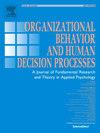The detachment paradox: Employers recognize the benefits of detachment for employee well-being and performance, yet penalize it in employee evaluations
IF 3.8
2区 管理学
Q2 MANAGEMENT
Organizational Behavior and Human Decision Processes
Pub Date : 2025-05-01
DOI:10.1016/j.obhdp.2025.104403
引用次数: 0
Abstract
The present research establishes what we call the “detachment paradox.” Managers recognize that psychological detachment from work during non-work hours benefits workers’ well-being and, critically, enhances their performance during working hours. Yet, these same managers penalize employees who are perceived to detach when evaluating their promotability. Using a variety of methodologies across 16 studies, we test the existence and the boundaries of this paradox. The detachment paradox is observed among various samples ranging from experienced managers to lay individuals, for commonly used detachment strategies (e.g., out-of-office emails, requesting vacation days), for hypothetical workers as well as for managers’ own workers, and even when detachment strategies are used for virtuous reasons (e.g., taking care of a sick relative). In addition, these studies establish that inferences about commitment to work drive the associated detachment penalty. Accordingly, workers are penalized less if detachment strategies are used for reasons that indicate a commitment to work. Lastly, we provide initial evidence that implementing formalized detachment policies (e.g., no emails over weekends) may reduce the detachment penalty and call for future research on this important topic.
疏离悖论:雇主认识到疏离对员工的幸福感和绩效的好处,但在员工评估中却对其加以惩罚
目前的研究确立了我们所说的“超然悖论”。管理者认识到,在非工作时间从工作中脱离出来有利于员工的健康,更重要的是,还能提高他们在工作时间的表现。然而,同样是这些管理者,在评估员工的晋升能力时,也会惩罚那些被认为离间的员工。在16项研究中使用各种方法,我们测试了这个悖论的存在和边界。从经验丰富的经理到外行的个人,在常用的脱离策略(例如,不在办公室的电子邮件,请求休假)中,在假设的员工以及经理自己的员工中,甚至在出于良性原因(例如,照顾生病的亲戚)使用脱离策略时,都可以观察到脱离悖论。此外,这些研究证实,对工作承诺的推断驱动了相关的疏离惩罚。因此,如果出于对工作的承诺而使用超然策略,员工受到的惩罚就会少一些。最后,我们提供了初步证据,证明实施正式的疏离政策(例如,周末不发电子邮件)可能会减少疏离惩罚,并呼吁未来对这一重要主题进行研究。
本文章由计算机程序翻译,如有差异,请以英文原文为准。
求助全文
约1分钟内获得全文
求助全文
来源期刊
CiteScore
8.90
自引率
4.30%
发文量
68
期刊介绍:
Organizational Behavior and Human Decision Processes publishes fundamental research in organizational behavior, organizational psychology, and human cognition, judgment, and decision-making. The journal features articles that present original empirical research, theory development, meta-analysis, and methodological advancements relevant to the substantive domains served by the journal. Topics covered by the journal include perception, cognition, judgment, attitudes, emotion, well-being, motivation, choice, and performance. We are interested in articles that investigate these topics as they pertain to individuals, dyads, groups, and other social collectives. For each topic, we place a premium on articles that make fundamental and substantial contributions to understanding psychological processes relevant to human attitudes, cognitions, and behavior in organizations. In order to be considered for publication in OBHDP a manuscript has to include the following: 1.Demonstrate an interesting behavioral/psychological phenomenon 2.Make a significant theoretical and empirical contribution to the existing literature 3.Identify and test the underlying psychological mechanism for the newly discovered behavioral/psychological phenomenon 4.Have practical implications in organizational context

 求助内容:
求助内容: 应助结果提醒方式:
应助结果提醒方式:


